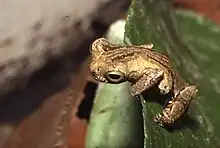Sarayacu tree frog
The Sarayacu tree frog or orange-shanked tree frog (Dendropsophus parviceps) is a frog that lives in much of eastern South America, in Brazil, Venezuela, Peru, Ecuador, Colombia, and Bolivia.[3] Scientists have seen it between 180 and 1600 meters above sea level.[1]
| Sarayacu tree frog | |
|---|---|
 | |
| Scientific classification | |
| Domain: | Eukaryota |
| Kingdom: | Animalia |
| Phylum: | Chordata |
| Class: | Amphibia |
| Order: | Anura |
| Family: | Hylidae |
| Genus: | Dendropsophus |
| Species: | D. parviceps |
| Binomial name | |
| Dendropsophus parviceps (Boulenger, 1882) | |
| Synonyms[3] | |
| |
The adult male frog is 14.3 to 18.7 mm long from nose to rear end. The adult female frog is 20.3 to 24.4 mm long. This frog changes color over time. It is light bronze with marks during the day and darker in color at night.[1]
The Latin name of this frog, parviceps means "small head."[1]
References
- Santiago R. Ron; Morley Read (February 9, 2012). "Sarayacu Tree Frog: Dendropsophus parviceps" (in Spanish). Amphibiaweb. Retrieved May 16, 2021.
- Claudia Azevedo-Ramos; Enrique La Marca; Luis A. Coloma; Santiago Ron (2004). "Sarayacu Treefrog: Dendropsophus parviceps". IUCN Red List of Threatened Species. 2004. The IUCN Red List of Threatened Species: e.T55589A11324458. doi:10.2305/IUCN.UK.2004.RLTS.T55589A11324458.en. Retrieved May 16, 2021.
- "Dendropsophus parviceps (Boulenger, 1882)". Amphibian Species of the World 6.0, an Online Reference. American Museum of Natural History. Retrieved May 16, 2021.
This article is issued from Wikipedia. The text is licensed under Creative Commons - Attribution - Sharealike. Additional terms may apply for the media files.
